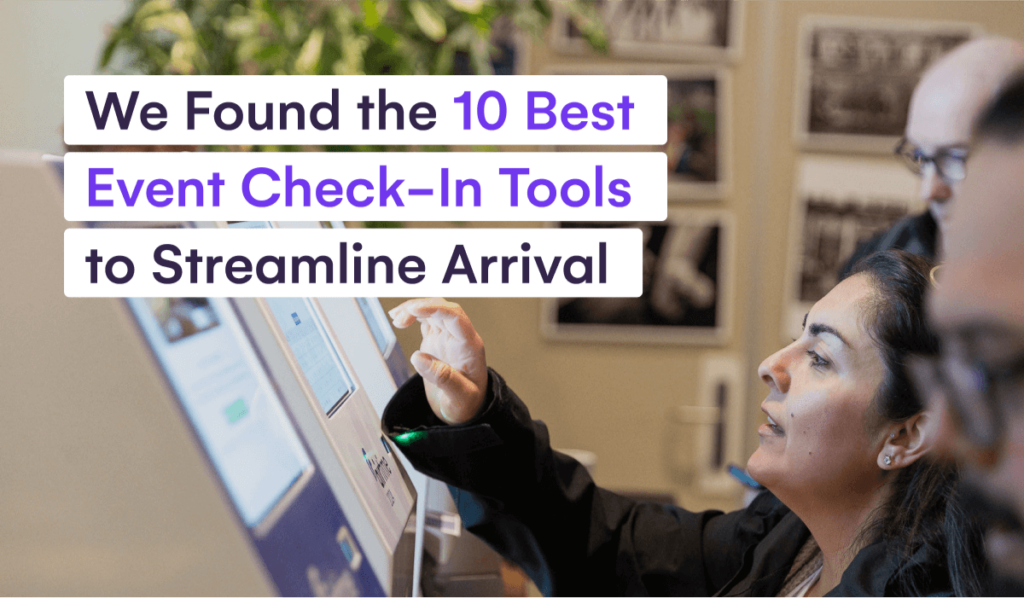We Tested the 7 Best Eventbrite Alternatives for Better Event Management

Eventbrite dominates the event management ticketing and discovery space, but its high fees and limited customization leave many organizers looking for alternatives. Some platforms offer better pricing, others provide more specialized features, and a few deliver complete solutions that outperform Eventbrite in every way.
In this guide, we analyze seven thoroughly tested alternatives for every type of event need and budget. Whether you’re seeking lower fees, advanced management tools, or better virtual event capabilities, there’s a platform here for you.
But first…
What is Eventbrite?
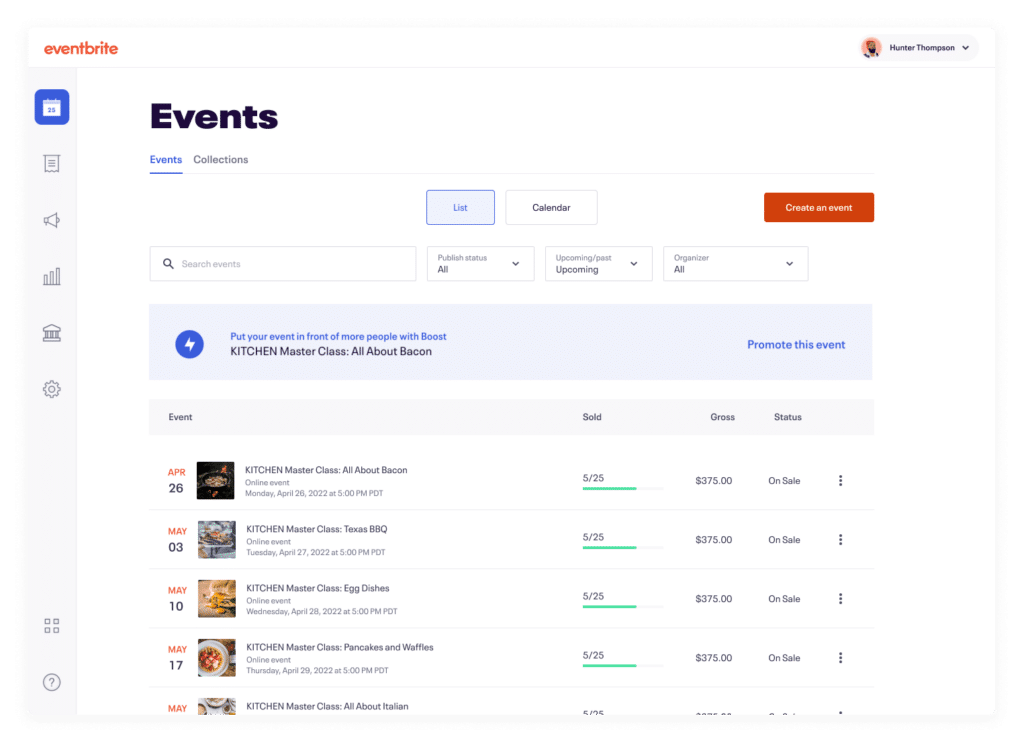
Eventbrite is the world’s leading event ticketing and discovery platform, trusted by millions of organizers and attendees globally. As an all-in-one event ticketing platform, it helps creators organize, promote, and sell tickets to events of all sizes, from small workshops to large festivals.
Beyond marketing and discovery, Eventbrite offers a limited set of planning and management tools to help organizers pull off memorable virtual, in-person, and hybrid events.
Key features
- Registration and ticketing: Create flexible ticket types for both in-person and online events with customizable registration forms.
- Marketing tools: Built-in email marketing with up to 10,000 daily sends, social media integration, and Eventbrite Ads.
- Mobile event app: On-site check-in, ticket scanning, and real-time attendance tracking.
- Payment processing: Integrated payment system with multiple payment methods, including Apple Pay and Google Pay.
- Analytics: Real-time sales tracking, attendee insights, and detailed financial reporting.
Pricing
Eventbrite offers a free basic plan with paid features:
- Basic plan: Free to publish events
- Service fees: 6.95% + $0.75 per paid ticket (typically paid by attendees)
- Pro plans (for email marketing):
- Pro 2K: $15/month or $144/year
- Pro 6K: $50/month or $480/year
- Pro 10K: $100/month or $960/year
Pros
- User-friendly interface for both organizers and attendees
- Robust marketing and promotional tools
- Strong mobile capabilities
- Large event discovery marketplace
- Integrated payment processing
Cons
- High service fees compared to alternatives
- Limited customer support
- Basic customization options
- Restricted event management features
- Can be expensive for larger events
Why look for Eventbrite alternatives
Eventbrite may dominate the event management space, but it’s not always the best fit for organizations managing large-scale or complex events. Many planners need a platform that goes beyond ticketing, offering robust tools to handle every moving part – from attendee registration and session scheduling to post-event analytics. If you’re looking for a solution that scales with your event’s needs while providing advanced customization and specialized features, there are powerful alternatives to consider.
Whether you’re looking for lower fees, more customization options, or specialized features for specific event types, here are the key reasons to explore alternatives:
- Lower service fees and more flexible pricing structures
- Enhanced customization capabilities for branding
- Better support for specific event types
- More robust virtual and hybrid event features
- Improved customer support quality
- Greater control over attendee data
- Local or regional platform focus
- Different payment processing options
Top 7 Eventbrite alternatives
- EventsAir
- Cvent
- Whova
- RingCentral Events
- Ticket Tailor
- Bizzabo
- Airmeet
1. EventsAir
EventsAir is an all-in-one event management platform that handles the entire event lifecycle—from planning to execution to analysis.
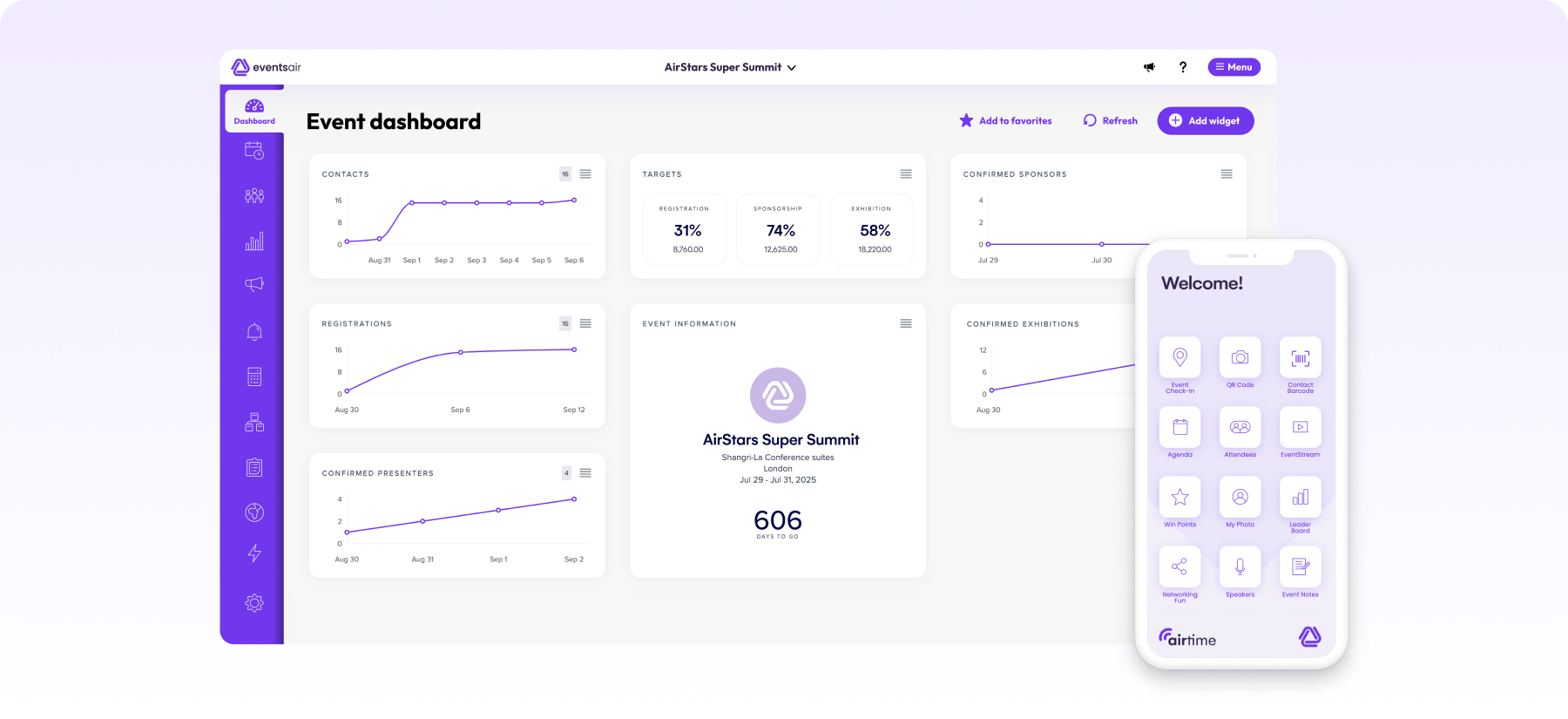
The platform serves professional conference organizers, associations, government agencies, and corporations who need to deliver sophisticated in-person, virtual, or hybrid events. Its comprehensive toolkit spans pre-event planning, registration, attendee engagement, and post-event analysis.
Plus, with native payment processing and marketing tools, you minimize tool swapping and data transfer.
Key Features
- Registration and ticketing: Create custom registration workflows with multiple ticket types and payment options
- Live-streaming: Manage virtual and hybrid events with integrated streaming capabilities
- Planning tools: Organize tasks, budgets, inventory, and registrations in a centralized dashboard
- Lead generation: Enable exhibitors to capture and track potential sales opportunities
- Networking tools: Connect attendees through scheduled meetings, virtual rooms, and instant messaging
- Mobile experience: Deliver schedules, updates, and networking features through a branded mobile app
- Marketing suite: Build event websites, launch email campaigns, and manage social media promotion
- Performance analytics: Monitor registration, engagement, and ROI through real-time reporting
Pricing
Pricing for EventsAir is available upon request. We’ll work with you to come up with a custom quote based on the complexity and size of the event. We offer a tiered pricing system based on your needs.
Pros
- Comprehensive platform suitable for large-scale events
- Highly customizable with flexible workflows
- Strong virtual and hybrid capabilities
- Detailed real-time analytics
Cons
- Stores attendee data individually rather than in groups
2. Cvent
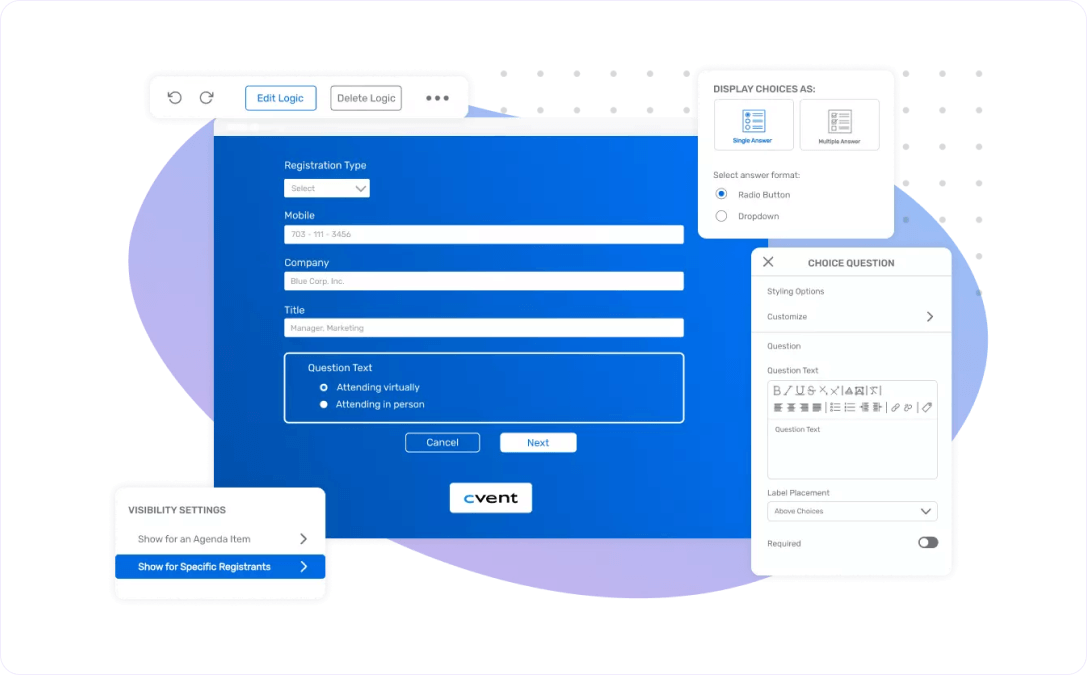
Cvent is another top-tier platform that offers a full suite of tools for managing large-scale events. From registration to reporting, Cvent stands out for its extensive feature set, including a venue directory, vendor sourcing, and advanced reporting capabilities.
Check out our guide to Cvent versus Eventbrite for a detailed comparison.
Key Features
- Event Registration: Design custom registration workflows with conditional logic and multiple ticket types.
- Venue Directory: Access and book venues through Cvent’s global database of event spaces.
- Budget Management: Track expenses, monitor costs, and manage event budgets in real-time.
- Engagement Tools: Run live polls, surveys, and Q&A sessions during events.
Pricing
Contact Cvent for custom pricing. Plans include annual license fees and per-registrant.
Pros
- Extensive venue and vendor network
- Powerful data analysis capabilities
- Comprehensive engagement features
- Strong integration options
Cons
- Complex interface with steep learning curve
- Features can feel disconnected
- Higher price point than competitors
3. Whova
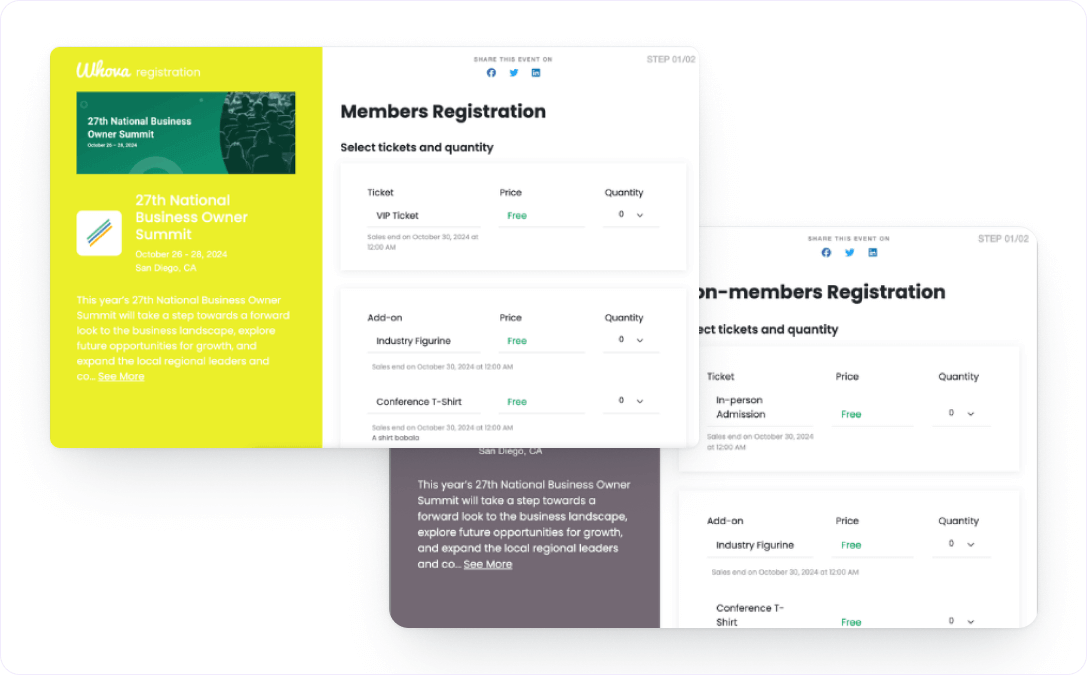
Whova specializes in creating engaging conference experiences through networking features and mobile-first design. The platform excels at fostering attendee connections and interaction, making it particularly effective for professional conferences and industry events.
Key Features
- Mobile Engagement: Deliver event schedules, networking tools, and real-time updates through a branded app.
- Interactive Tools: Drive participation with live polls, Q&A sessions, and automated attendee matchmaking.
- Virtual Integration: Host online events with built-in video conferencing and streaming capabilities.
- Event Management: Create detailed agendas with multi-track sessions and real-time schedule updates.
Pricing
Contact Whova for pricing based on attendee count and event duration.
Pros
- Strong networking and engagement tools
- User-friendly mobile experience
- Effective virtual event support
Cons
- Limited reporting capabilities
- Basic branding customization
- Restricted features for large events
4. RingCentral Events

RingCentral Events is designed specifically for virtual and hybrid events. It offers a fully integrated platform with built-in live-streaming, networking, and virtual expo capabilities. It’s popular for webinars, conferences, and virtual meetups.
Key Features
- Live Broadcasting: Stream sessions, panels, and presentations with built-in production tools
- Virtual Networking: Enable one-on-one video chats, group discussions, and themed breakout rooms
- Exhibitor Tools: Provide virtual booths and engagement metrics for sponsors and exhibitors
- Event Branding: Customize virtual spaces with branded elements and interactive features
Pricing
RingCentral Events offers three subscription levels to match different event needs:
- Core plan starts at $20 per month
- Advanced plan starts at $25 per month
- Ultra plan starts at $35 per month
Pros
- Reliable live-streaming capabilities
- Strong virtual networking tools
- Intuitive interface design
Cons
- Limited in-person event features
- Higher costs for large events
- Occasional platform instability
5. Ticket Tailor
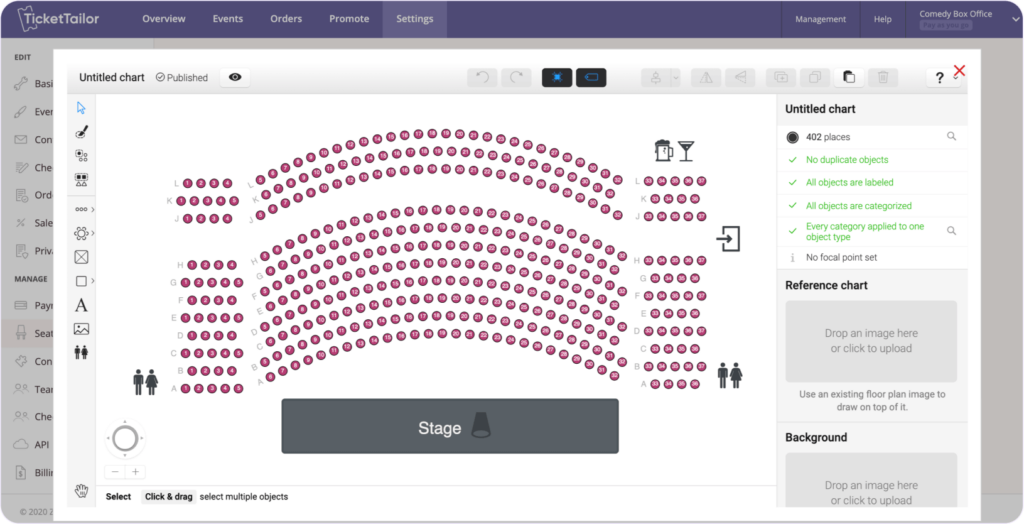
Ticket Tailor offers straightforward ticketing for small to medium-sized events with a focus on low fees. The platform’s flat-fee pricing model makes it ideal for independent organizers, non-profits, and budget-conscious event planners looking to maximize ticket revenue.
Key Features
- Ticketing System: Create multiple ticket types with customizable pricing and availability
- Event Pages: Build branded ticketing pages with custom domains and design elements
- Payment Processing: Accept payments through multiple gateways with instant payouts
- Marketing Integration: Connect with tools like Mailchimp, Zapier, and Google Analytics
Pricing
Ticket Tailor maintains a simple pricing structure, with your first 2,000 tickets free each year. You can choose between two options:
- Pay Upfront: Starting at $0.28 per ticket
- Pay as You Sell: $0.75 per ticket
Pros
- Low, transparent fees
- Simple setup process
- Strong marketing integrations
Cons
- Basic event management features
- Limited promotional tools
- Restricted customization options
6. Bizzabo
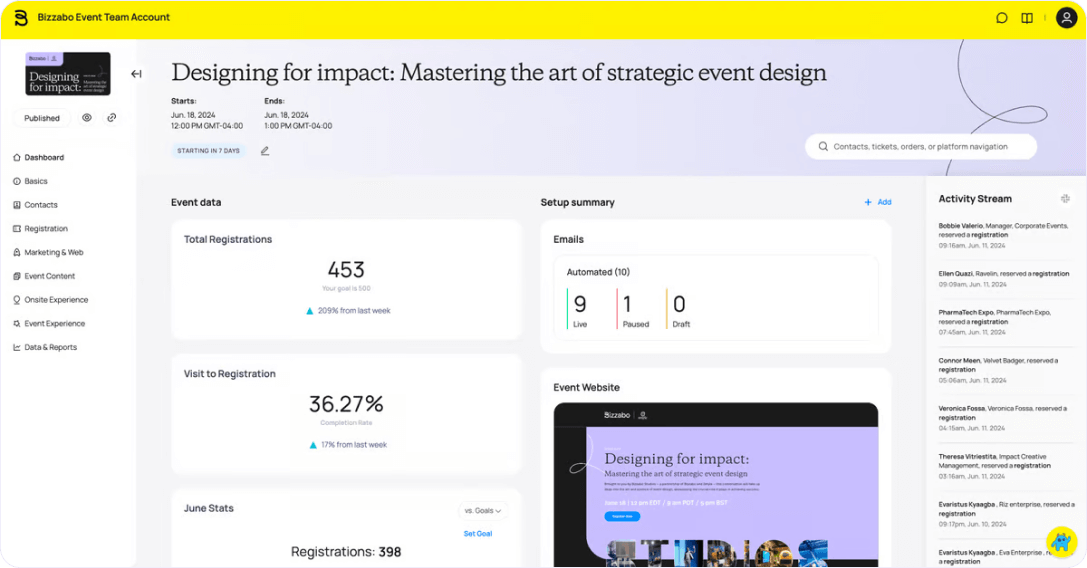
Bizzabo delivers customizable event solutions for B2B conferences and corporate events. The platform focuses on creating branded experiences through robust marketing tools, analytics, and engagement features for both in-person and virtual formats.
Key Features
- Customizable Registration: Full control over the branding and design of the registration process.
- Advanced Analytics: Deep reporting on attendee engagement, ticket sales, and marketing ROI.
- Marketing Automation: Integrated tools to promote events via email and social channels.
- Onsite and Virtual Event Support: Offers tools for both in-person and hybrid events, including mobile apps and live-streaming.
Pricing
Bizzabo’s Event Experience OS starts at $499 per month. Enterprise solutions are available with custom pricing based on event requirements and scale.
Pros
- Extensive branding options
- Comprehensive analytics suite
- Strong hybrid capabilities
Cons
- Premium pricing structure
- Complex for small events
- Steep learning curve
7. Airmeet
Last up? Airmeet.
This platform specializes in interactive webinars and virtual networking events. The platform stands out with features like virtual tables and speed networking, making it particularly effective for online conferences and community-building events.

Key Features
- Virtual Rooms: Host discussions using themed tables and breakout spaces.
- Interactive Tools: Engage audiences with live Q&A, polls, and chat features.
- Networking System: Enable speed networking and one-on-one meeting scheduling.
- Event Customization: Brand virtual spaces with custom backgrounds and logos.
Pricing
Airmeet’s premium webinar package starts at $167 per month. Contact Airmeet for custom pricing on additional plans and features based on event requirements.
Pros
- Limited in-person features
- Occasional technical issues
- Basic analytics tools
Cons
- Limited in-person features
- Occasional technical issues
- Basic analytics tools
Pricing
Airmeet offers fixed-price and quote-based plans. For premium webinars, the pricing starts at $167 monthly. You’ll need to request a personalized quote for other plans.
Conclusion
EventsAir provides comprehensive event management for professional conferences, while platforms like RingCentral Events excel at virtual experiences. For tight budgets, consider Ticket Tailor, and for enterprise customization, look to Bizzabo or Cvent.
Consider these key factors when choosing:
- Event size and complexity
- Budget and fee structure
- Required customization level
- Virtual or in-person format
- Integration requirements
Ready to elevate your next event? Get started with EventsAir today.



